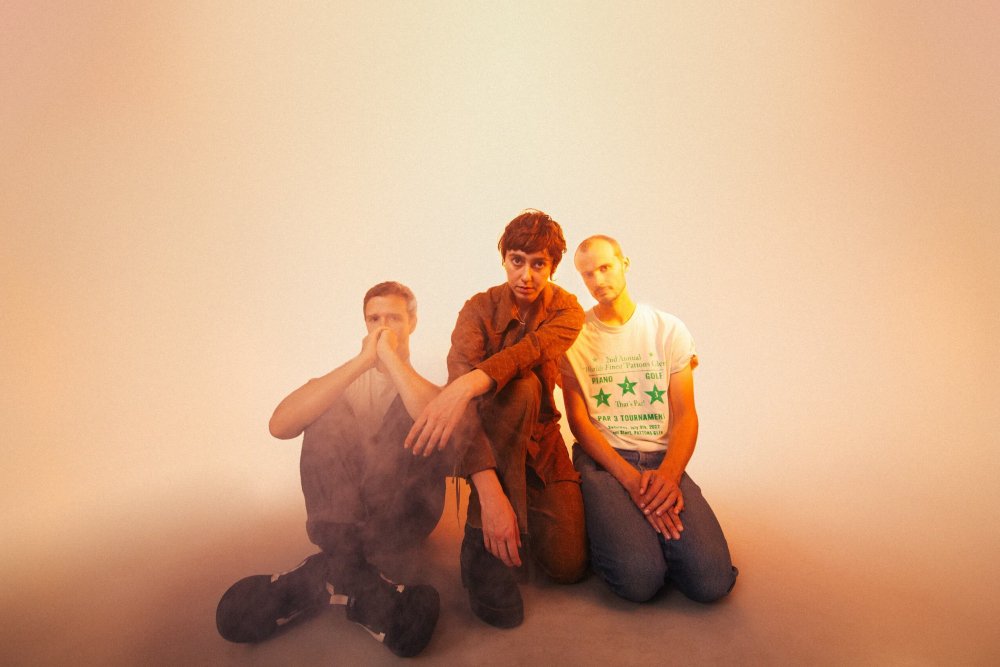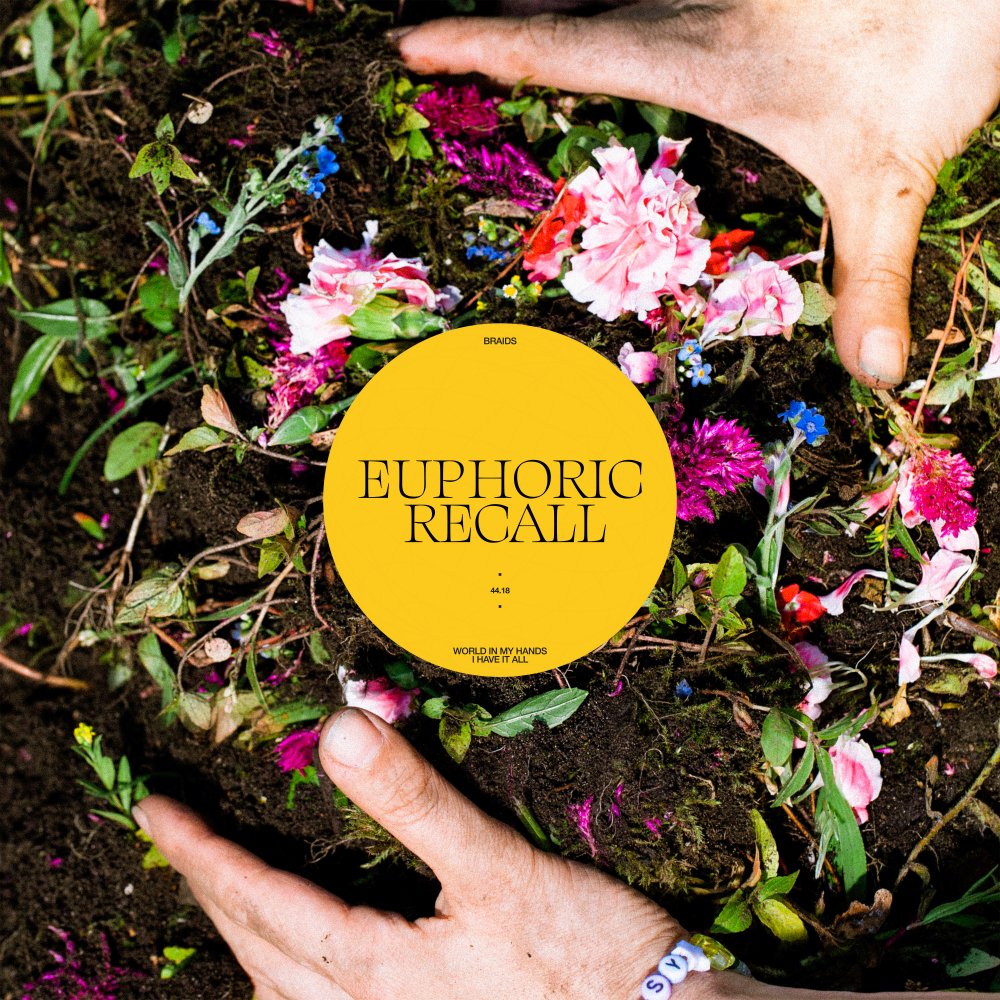Click Image to Download!
Braids — Canadian musicians Taylor Smith, Raphaelle Standell-Preston, and Austin Tufts — have regenerated their creative selves with every record. The Montréal trio moves intuitively, harnessing an emotional honesty and meticulous craft rooted in a willingness to let go and trust in one another; they immerse fully into the space of a full-length album. This devotion to exploring their art, together, has made for one of the more daring and fluid catalogs in contemporary experimental pop over the past decade. They see their story as a series of actions and reactions, a collective expression that swings like a pendulum between open-hearted freeness and process-driven precision. Their 2011 Polaris Prize-shortlisted debut, Native Speaker, presented the purity of childhood friends stretching outward in their first endeavor. 2013’s Flourish // Perish found them more intentional, embracing electronics in pursuit of perfection. 2015’s Deep In The Iris, a Polaris Prize nominee and JUNO Award winner for Alternative Album of the Year, swung back to a warmer hybrid sound that softened the parameters. In 2020, Braids returned from their longest break with their most ambitious work, Shadow Offering, a potent, high-stakes rock record envisioned especially for the live setting. To fans, that is their superpower, the instinctive fusion that happens on stage, “kinetic and exciting” per The New York Times; they’ve performed over 500 shows worldwide and toured with the likes of Future Islands, Purity Ring, and Toro y Moi. So when Shadow Offering was released to a world in lockdown, they sought instead to embody that joy and playful spontaneity in the studio. The three artists reconvened for something freer and wholly anew, greenlighting the ideas that simply felt good the second they hit the air. Braids abandoned strategy, burned it down, and realized their love record. Love, all of it; the unbound bliss, the budding impulses, and the messy imperfections, a supernova swirled up in a suite of bold, melodic, symphonic pop songs surrendered to the present, Euphoric Recall.
The complexity of love and healing is not a new subject for Braids, but the vantage from which they see and sense it here is. “How you cultivate your heart space is extremely important to the outcome of what you are pursuing,” says Standell-Preston, who found herself in the rush of new love, oozing with happiness and tenderness, as the band entered recording sessions. “I think that when we are operating from a place of safety and feeling loved and have intentions of loving, we can access really interesting places.” As a lyricist, she draws generously from this heart space, often writing on the spot, in just a few takes. Lines are vivid, exhilarating, and evocative, a directness indicative of fully knowing oneself and engaging the moment. Smith and Tufts understood the epiphany intrinsically. As songs emerged, the rhythms and textures became brighter and looser, brimming with life, chasing the feeling they’d been craving in the absence of shows. Midway through, Smith could see it clearly but didn’t want to disrupt it; he placed a note to his pinboard, backward and out of view, that read, “LOVE RECORD.”
Written, recorded, self-produced, and mixed at Studio Toute Garnie, their Montréal studio, the music of Euphoric Recall is both unrushed and urgent, lush yet captured with in-the-room clarity. Elements weave in and out, shading a rich universe without crowding it. Tufts brought a sharpened ear to sessions after producing records for Devon Welsh, Tess Roby, and others, sensing what songs needed from his drums, be it subtle balance or cathartic, jazz-inflected fills. Smith arrived from the depths of solo experiments and studio work, an ever-thorough multi-instrumentalist and sound designer with a renewed feel for fun and a move-forward mindset. Along with the album’s thematic sensuality, Standell-Preston carried the pulse of her club-minded project, Blue Hawaii, adding to their shared desire for new material to groove more viscerally. Early into it, the group knew they wanted a guiding presence, manifested as string accompaniment. Together they arranged strings, with contributions and notations from Edwin De Goeij (who also plays the piano on several tracks), bringing the scores to an ensemble on cello, viola, and violins. The classically-trained players lit up with the freedom of the avant-garde structures; their resulting flourishes thread the album “like a protective blanket or little hands holding the songs,” says Standell-Preston.
The strings first appear in the back half of the 9-minute lead track, “Supernova,” seen as a distillation of the old Braids giving way to the new. Lyrics scatter through Standell-Preston’s frenetic free associations; her tendency to work in sudden spurts, to burn bright and fast, has earned her the star-bursting nickname. She collages incoming text messages with widespread political dread and bewilderment before the song shifts to a far lighter space. “I am a Supernova, Nova, known to none but myself and my lover,” she exhales over ascending strings, piano flutters, meandering guitar lines, and relaxed drum patterns. Her gaze turns from the red-hot chaos of life to the infatuations of fresh romance, from external to internal.
“Apple” is among the most joyous moments in the Braids discography, a celebration of seeing new possibilities in the eyes of a lover, acknowledging past loss and trauma with a new state of heart that’s been opened and filled. “I’ve never wanted to give someone the most beautiful piano,” sings Standell-Preston, her sentiment repeated (“Spend all my money on you”) a notch sweeter each time, mirrored in the bursting instrumentation recorded live off the floor. Tufts’ percussion marches and taps with feel-good intent evoking early Animal Collective. Smith’s synth, an arpeggiated sequence he’d been keeping for the right demo, plays aggressively off the softer sonics for a heightened, sparkling shoegaze effect. “We didn’t have to work hard on this one; we could just jump in and enjoy the ride of it,” says Smith.
Next comes the clear-eyed and assured “Evolution,” a punchy, pop-forward song that gives the record a grounded notion amidst the sprawling pace. Standell-Preston delivers a pure and casual melody above an equally clean rhythmic pattern accentuated by wide, exploding tom fills and shimmering keys. She likens the act of patience to that of evolving: “Evolution in and of itself is a patient act. Our pursuit of the individual self, which comprises all realms of human emotion, is sweetened with the intention and act of patience from ourselves, from those that we love and those who love us.” There’s a certain ease, lightness, and unspeakable magic to its immediacy, as if unaware of itself, an unapologetic Braids banger.
“Left/Right” opens on a sound bite where Standell-Preston reacts loudly to first hearing something in the studio, one of the many blips of humor and risk that lend a homespun looseness throughout. Here it’s her poetry that shines, a stream-of-consciousness ode to Montréal and the messes we make in our 20s. Smith circles her lines at the piano, plaintive and hypnotic, as the orchestral hues deepen; the free-float ends on a frenzy of sputtering sound design.
The abrupt cut sets up “Millennia,” which fuses celestial electronica with the hands-in-the-dirt emotion suggested in Euphoric Recall’s artwork and displayed across Standell-Preston’s raw, super-charged vocal performance. Towering walls of synth and strings meet drum machine claps, big booming toms, and snare drum rolls; it’s an effective scene change and a bridge between the record’s two sides. Unfolding slowly over ambient whirs and acoustic riffs, “Lucky Star” radiates an intimate melancholy. “I miss you I miss I miss you / I miss you all the time even with you,” she projects longingly across the chords like a slow-motion punk song.
A thousand tiny artistic deaths and rebirths led Braids to Euphoric Recall, and its final 13-minute journey is their defining statement; the patient pop poetry of “Retriever” and the textural ecstasy of the title track flash the album’s life before your eyes. Featuring the first-ever Standell-Preston & Tufts duet, we hear various phrases resurfacing from the songs that preceded, and the string players improvising under the open-ended cue to play their favorite parts at will — a clever suggestion, in the spirit of Pink Floyd, an unexpected but apt reference for this music’s strange and fearless mystery. The progression ends with it all riding a sustained synth note into a maelstrom of rapturous love remembered, profoundly moving, and true to its namesake.










